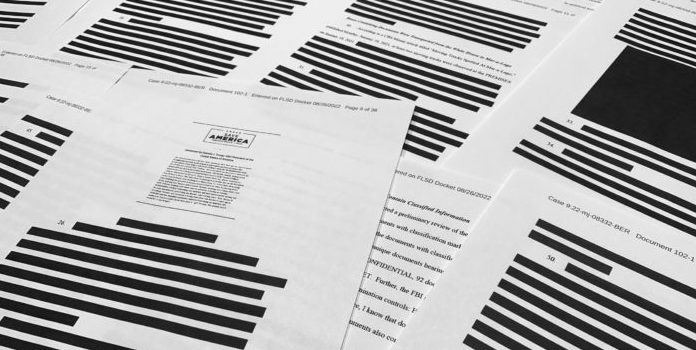(Ken Silva, Headline USA) The U.S. Marshals Service has a secretive recordkeeping system akin to the one established by former FBI Director J. Edgar Hoover more than 80 years ago, according to a newly unearthed government document provided to Headline USA.
The newly unearthed document is an April 1997 FBI report about the bureau’s investigation into Oklahoma City bomber Timothy McVeigh. The FBI report was provided to this publication by Utah attorney Jesse Trentadue, who’s obtained thousands of FBI records via the Freedom of Information Act. It was first discovered by PhD historian Wendy Painting, who works with Trentadue.
According to the FBI report, agents were investigating whether McVeigh had sent “threatening letters” to former U.S. Marshals Director Henry Hudson. FBI agent Leslie Hahn wrote in the report that she spoke with a US Marshals “informational resource specialist” named David Turk, who told her that no such letters from McVeigh were found in the Marshals Service’s database. However, Turk also told Hahn that he didn’t search the Marshals’ “zero-files”—”which contain information received but not entered into the database,” the FBI report says.
🚨NEW: It's been known for decades that the FBI has a separate filing system for records that it wants to keep secret.
Now, a newly unearthed record shows that the US Marshals Service has a similar system. Like the FBI's system, it was called the "Zero-files"
STORY BELOW 🧵 pic.twitter.com/Wfh6KYfiL3— Ken Silva (@JD_Cashless) October 30, 2025
The Marshals Service’s recordkeeping system described in agent Hahn’s report is strikingly similar to the FBI’s system, which was also called the “zero-files” in the 1990s. As has been widely reported, the FBI’s system entails agents putting evidence that would be used in court in an “official case file” but keep other records separate. The separate file, which has had various names, keeps potentially damaging and embarrassing records from both defense attorneys and the wider public.
But while the FBI’s “zero-files” have been public knowledge for decades, Trentadue said the newly unearthed report is the first time he’s seen anything about the Marshals also having something similar.
“If the Marshals have something like this, you can imagine that just about every agency does,” said Trentadue, who also provided an email suggesting that the ATF has a secret filing system, too.
The Marshals Service declined to comment on the matter, citing the government shutdown as the reason for its silence.
“During the lapse in appropriations, all public affairs functions are limited to mission essential and related to emergencies involving the safety of human life and the protection of property,” Marshals Service public affairs officer Brady McCarron said in an email.
HISTORY OF THE ‘ZERO FILES’
The FBI’s secretive recordkeeping dates back at least to the 1940s, when former director Hoover created what was known as “June Mail,” also known as the “June files.”
“All bureau records that were not required to be destroyed and that authorized illegal acts or were the fruits of illegal buggings, wiretappings, or burglaries were ordered to be designated as ‘June Mail,’” wrote civil rights attorney Alexander Charns in his book Cloak and Gavel: FBI Wiretaps, Bugs, Informers, and the Supreme Court. “‘June Mail’ was sent to a high-security safe called the Special File Room. These parallel filing systems were designed so that agents could plausibly deny knowledge of illegal tactics.”
According to an article in The Center for Public Integrity, the June files were ended in 1978. But that didn’t stop the secrecy. Instead, the FBI simply renamed its system the aforementioned “zero-files.” That monicker lasted through the 90s, until the bureau again renamed it to the “I-drive”—then, not long after that, to the “S-drive.” It’s not publicly known what name the FBI and other agencies have for their secretive systems today.
Trentadue, whose FOIA litigation helped bring the S- and I-Drives to light around 2011, told The Center for Public Integrity at the time that the various names would be humorous if not for the unconstitutionality of it all.
“You think you’ve exposed them and it’s over, and they set up another,” he said.
Ken Silva is the editor of Headline USA. Follow him at x.com/jd_cashless.

